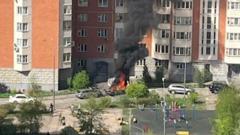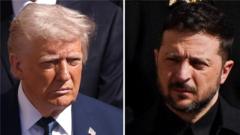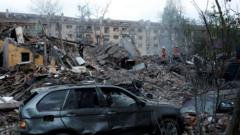In a shocking turn of events, General Yaroslav Moskalik was killed in a car bomb explosion in the eastern suburb of Balashikha, sparking discussions about security and ongoing conflicts in the region.
Senior Russian General Assassinated in Car Bomb Attack in Moscow

Senior Russian General Assassinated in Car Bomb Attack in Moscow
A high-ranking Russian military official has died in a violent car bombing incident outside his residence in Moscow.
The death of General Moskalik, known for his role in Ukrainian peace talks, highlights rising tensions as drone attacks continue in Ukraine, following a history of targeted military assassinations within Russia's borders.
A senior Russian general has been confirmed dead following a car bomb explosion in Moscow, as the Investigative Committee of Russia announced the news. General Yaroslav Moskalik was killed instantaneously when an improvised explosive device detonated in his vehicle parked outside his home in Balashikha, a suburban area of the capital. The explosion occurred as Moskalik was passing by his Volkswagen Golf, believed to have been rigged with pellets to maximize the damage.
Moskalik was a significant figure in the aftermath of the conflict in Ukraine, participating in talks held in Paris in 2015 that led to the Minsk agreements aimed at curbing violence between Ukraine and Russian-backed separatists. He was part of a high-level Russian delegation, including Foreign Minister Sergey Lavrov, during those discussions.
As the details of the incident unfold, visuals shared across social media platforms like Telegram depict the bombed-out vehicle consumed by flames. To date, no group has taken responsibility for the attack on the general. This incident coincides with ongoing diplomatic efforts where U.S. envoy Steve Witkoff is set to have meetings with Russian President Vladimir Putin to discuss the Ukraine crisis.
Meanwhile, Lavrov expressed Russia's willingness for negotiations over Ukraine, asserting that certain terms needed adjustment. In Ukraine, the conflict rages on with continued drone assaults, resulting in tragic civilian casualties, including a child in Pavlohrad, which underscores the escalating violence.
This assassination marks a continuation of targeted attacks against military officials in Russia, although such incidents are relatively uncommon within Moscow. Earlier this year, Armen Sargsyan—a leader of a pro-Russian faction—sustained fatal injuries from an explosion in Moscow, while last year, Lt. Gen. Igor Kirillov was similarly targeted. The implications of these attacks raise pressing questions about security and stability within the Russian military hierarchy during this turbulent time.
A senior Russian general has been confirmed dead following a car bomb explosion in Moscow, as the Investigative Committee of Russia announced the news. General Yaroslav Moskalik was killed instantaneously when an improvised explosive device detonated in his vehicle parked outside his home in Balashikha, a suburban area of the capital. The explosion occurred as Moskalik was passing by his Volkswagen Golf, believed to have been rigged with pellets to maximize the damage.
Moskalik was a significant figure in the aftermath of the conflict in Ukraine, participating in talks held in Paris in 2015 that led to the Minsk agreements aimed at curbing violence between Ukraine and Russian-backed separatists. He was part of a high-level Russian delegation, including Foreign Minister Sergey Lavrov, during those discussions.
As the details of the incident unfold, visuals shared across social media platforms like Telegram depict the bombed-out vehicle consumed by flames. To date, no group has taken responsibility for the attack on the general. This incident coincides with ongoing diplomatic efforts where U.S. envoy Steve Witkoff is set to have meetings with Russian President Vladimir Putin to discuss the Ukraine crisis.
Meanwhile, Lavrov expressed Russia's willingness for negotiations over Ukraine, asserting that certain terms needed adjustment. In Ukraine, the conflict rages on with continued drone assaults, resulting in tragic civilian casualties, including a child in Pavlohrad, which underscores the escalating violence.
This assassination marks a continuation of targeted attacks against military officials in Russia, although such incidents are relatively uncommon within Moscow. Earlier this year, Armen Sargsyan—a leader of a pro-Russian faction—sustained fatal injuries from an explosion in Moscow, while last year, Lt. Gen. Igor Kirillov was similarly targeted. The implications of these attacks raise pressing questions about security and stability within the Russian military hierarchy during this turbulent time.






















